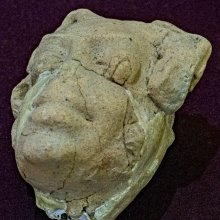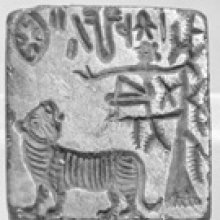Shir, Śir: 6 definitions
Introduction:
Shir means something in Hinduism, Sanskrit, Hindi, biology. If you want to know the exact meaning, history, etymology or English translation of this term then check out the descriptions on this page. Add your comment or reference to a book if you want to contribute to this summary article.
The Sanskrit term Śir can be transliterated into English as Sir or Shir, using the IAST transliteration scheme (?).
Images (photo gallery)
(+1 more images available)
Biology (plants and animals)
Source: Google Books: CRC World Dictionary (Regional names)1) Sir in India is the name of a plant defined with Allium sativum in various botanical sources. This page contains potential references in Ayurveda, modern medicine, and other folk traditions or local practices It has the synonym Porrum ophioscorodon (Link) Rchb. (among others).
2) Sir is also identified with Buchanania lanzan It has the synonym Buchanania latifolia Roxb..
Example references for further research on medicinal uses or toxicity (see latin names for full list):
· Journal of Environmental Biology (2001)
· Indian Journal of Pharmaceutical Sciences (1978)
· Flora Indica (1832)
· Journal of Tree Sciences (1984)
· Taxon (1979)
· Journal of Ethnopharmacology (2000)
If you are looking for specific details regarding Sir, for example extract dosage, side effects, health benefits, chemical composition, pregnancy safety, diet and recipes, have a look at these references.

This sections includes definitions from the five kingdoms of living things: Animals, Plants, Fungi, Protists and Monera. It will include both the official binomial nomenclature (scientific names usually in Latin) as well as regional spellings and variants.
Languages of India and abroad
Sanskrit dictionary
Source: Cologne Digital Sanskrit Dictionaries: Cappeller Sanskrit-English DictionaryŚir (शिर्).—(—°) crushing, afflicting.
Source: Cologne Digital Sanskrit Dictionaries: Monier-Williams Sanskrit-English DictionaryŚir (शिर्):—([nominative case] śīr; √śṝ), hurting, injuring, wounding (only ifc. e.g. śaśīśa-śiśu-śīḥ), [Kirātārjunīya xv, 5.]
[Sanskrit to German]
Sanskrit, also spelled संस्कृतम् (saṃskṛtam), is an ancient language of India commonly seen as the grandmother of the Indo-European language family (even English!). Closely allied with Prakrit and Pali, Sanskrit is more exhaustive in both grammar and terms and has the most extensive collection of literature in the world, greatly surpassing its sister-languages Greek and Latin.
Hindi dictionary
Source: DDSA: A practical Hindi-English dictionary1) Shir in Hindi refers in English to:—(nm) the head; -[vyavaccheda/vyavacchedana] beheading, chopping off the head; ~[strana] headwear, head-dress..—shir (शिर) is alternatively transliterated as Śira.
2) Shir in Hindi refers in English to:—(nm) a python; milk; ~[ra-shakara] milk and sugar; [ho jana] to get inseparably intermixed (like milk and sugar), to develop extreme intimacy, to become one with each other..—shir (शीर) is alternatively transliterated as Śīra.
3) Sir in Hindi refers in English to:—(nm) see [sira] a pond, pool; an arrow; one of the four top-valued playing cards; (a) conquered, subdued; ~[amjama] see [saramjama kasha] mischief monger; impudent, rebellious; [kashi] mischief-mongering; impudence, rebelliousness; [khata] stamped agreement/document, etc; [gana] leader (of a gang), ring-leader; [garmi] hectic activity; passionate effort; enthusiasm; [gujashta] description, narration; happening, event; [goshi] whispers, whispering campaign/complaints (against); [jamina] country; territory; [jora] impudent, insolent; hence [jori] (nf); ~[taja] see [sirataja; ~darda] headache botheration; ~[dardi] botheration; source of anxiety/concern; ~[dara] a chieftain; leader; boss; a sikh; ~[dari] the office, function or status of a [saradara; ~nama] well-known, renowned, famous; ~[nama] form of address and superscriptional formalities in a letter etc.; ~[pamca] the head [pamca; ~parasta] a patron; supporter; ~[parasti] patronage; support; ~[peca] an ornament worn over the turban, a diadem; [pharoja] honoured; arrogant; hence [pharoji] (nf); ~[pharosha] ready to sacrifice one’s life; intrepid; ~[pharoshi] readiness to sacrifice life; intrepidness; ~[shara] full to the brim; bubbling; buoyant; -[vasamana] bag and baggage; ~[shumari] census; ~[sabja] green, verdant; prosperous; [sare-ijalasa] in the court, while the court is in session; [sare-darabara] openly; [sare-nau] afresh, anew; [sare-bajara] openly, publicly; [sare-shama] early in the evening, as soon as the evening sets in; —[karana] to conquer; to subdue; to vanquish; —[hona] to be conquered; to be subdued; to be vanquished; —[mamdhana] to impose on; —[mumdate hi ole pade] ill-luck overtaking at the very out set..—sir (सर) is alternatively transliterated as Sara.
4) Sir in Hindi refers in English to:—(nm) head; top, apex; highest part or point; ~[kata] beheaded, headless, decapitated; ~[khapai] (the process of) taxing one’s brain over-much; too much of mental exertion; ~[cadha] cheeky, given too much of lift; ~[taja] (lit. and fig.) crown, the best (amongst); diadem; chief; master, husband; ~[trana] a headwear; ~[nama] form of address (in a letter etc.); ~[peca] a typical turban; an ornament fixed on the turban; ~[mumda] having a cleanshaven head; ~[maura] see ~[taja; ~hana] headrest; the upper end of a bedstead; —[alaga karana] to behead, to chop off the head; —[ana, ke] to possess, to obsess; to be charged with; —[amkhom para] with one’s heart and soul; most willingly, most cordially; —[amkhom para bithana/rakhana] to give a most cordial and affectionate treatment; —[amkhom para hona] to be deferentially welcome;. to be obeyed with reverence; —[uthakara calana] to hold one’s head high, to have nothing to be ashamed of, to walk proudly/conceitedly, to look big; to strut; —[uthate hi kucala dalana/dena] to nip in the bud, to crush in the egg; —[uthana] to rise in revolt, to rebel; —[uthane ki phurasata na hona] not to have a moment’s respite; —[uda jana] to be beheaded, the head to be chopped off; —[uda dena] to behead, to chop off the head; —[utarana] to behead; —[umca karana]to hold one’s head high, to be proud (of), to feel a sense of pride; —[kadamom para rakhana] to bow in obeisance; to make a complete surrender; —[kalama karana] to behead, to chop off the head; —[kaham phodum]? where to seek ?, where to find ?, where to go ?; —[ka na pamva ka] having neither beginning nor end, absurd; —[ka pasina pamva ko ana] to work assiduously; to perspire profusely; —[ka bojha utarana] to be freed of a burden; to fulfil an obligation; —[ka bojha talana] to finish, with an assignment, to see a thing through somehow or the other; —[ka bavala hona] to be a headache, to be a source of botheration; —[ki aphata talana] to be rid of a headache/botheration; —[ki kasama] lit. by the head—I swear by my life !; —[ki tali jana para ai] spared by one calamity, attacked by another; —[ki sudha na pamva ki budha] to be out of senses, to be conscious neither of self nor of surroundings; —[ke bala] headlong; with due deference; —[ke satha hona] to be with one’s life, to last as long as life lasts; —[kore ustare/chure se mumdana] to fleece ruthlessy; —[khapana] to beat one’s brains, to tax one’s brain, to exert; —[khana] to pester, to plague, to go on bothering; —[khali karana] to over-tax one’s brain; to chatter somebody’s brain out; —[khujalana] to be in for a beating/thrashing; —[khujalane/khujane ki phurasata/muhalata na hona] to be up to the elbows, to be up to the eyes in the work, to have one’s hands full, to have not even breathing respite; —[kholana] to break somebody’s skull; -[gamja kara dena, mara marakara] to thrash someone bald; to give a sound beating; —[girana] to behead; —[ghutanom mem dena] to be gloomy/glum; to bow the head in shame; —[ghumana] to feel giddy, to suffer from vertigo; —[cakarana] see —[ghumana; —cadhana] to take too much liberty; to take much lift; —[cadhakara bolana] the cat to jump out of the bag, the secret to be exposed by itself; to gab through obsession; —[cadhakara bole, jadu vaha jo] a spell must somehow procure a tangible expression; —[cadhana] to become too cheeky, to take too much liberty; —[cadhana] to spoil (as a child/servant etc.) by indulgence; to make too much of; —[catana] to go on pestering, to tax one’s brain, to plague; —[jana] to lose one’s life; (a responsibility etc.) to devolve on; —[jhukana] to feel ashamed, to hang the head (in shame); —[jhukakara saja bhogana] to kiss the rod; —[jhukana] to bow the head (in saltation); to look down through shame; to acquiesce; —[takarakara mara jana] to make desperate bids in vain; to meet a sad end in frustration —[takarana] to dash the head against; to suffer too much of mental exertion; —[dalana] to impose upon, to cause (a responsibility etc.) to devolve (on); —[tarashana] to behead; to chop off the head; ~[toda koshisha karana] to make a frantic/desperate bid; —[thama kara baitha jana] lit. to sit with the head resting on the hands—to suffer a stroke of ill-luck; —[thama lena] to hold the head (as expressive of having suffered a tragic blow); —[thopana] to impose (upon); to accuse; —[dukhana] to suffer from headache; —[dena] to stake one’s life, to die (for); —[dhada ki baji lagana] to burn one’s boats; —[dhunana] to beat the head as a mark of mourning; to weep and wail aloud; —[na uthane dena] to allow no respite, to keep thoroughly engaged; to give no lift/quarter; to give no opportunity to rise against; —[na pamva/paira] groundless, having no logic whatever, absolute absurdity; —[navana] to bow one’s head (in obeisance); —[nahim utha sakana] too burdened with somebody’s acts of grace to claim equal footing; to be too busy; —[nica karana] to inflict a defeat; to cause embarrassment; to hang one’s head in shame; —[nica hona] to suffer a defeat; to feel embarrassed/ashamed; —[pakadakara baithana] see —[thama kara baitha jana; —pakada kara raha jana] to be stunned still by grief; —[pakada kara rona] to bemoan, to weep and wail; —[patakana] to make frantic efforts; to mourn, to weep and wail; —[padana] to be obliged to shoulder (a responsibility etc.); to be imposed on; to have (an obligation etc.) devolved on; —[padi bala jhelana] to hold the baby; —[pade ka sauda] a matter with no alternative; to have to undertake per force, to be obliged to take up; —[para] on the head, close at hand; —[para ahasana rakhana] to make someone grateful, to impose a burden of gratitude; —[para amkhem na hona] to be mentally blind, to be unheeding; —[para a jana] to approach very near; to be imminent; to be face to face with; to devolve on; —[para (asamana/ghara) uthana] to create a havoc; to cause an uproar; to kick up a row; —[para asamana tutana] to be in the grip of a terrible affliction, a calamity to befall; —[para kaphana bamdhana] to risk one’s life, to hold one’s life in one’s hand; —[para kayamata tutana] a great calamity to befall, to be in the grip of a terrible affliction; —[para kayamata barapa karana] to cause a calamity to befall, to create a havoc; to cause an uproar; —[para kali hamdiya rakhana] to feel ashamed; —[para kurana uthana] to swear by the Qoran; —[para kurana rakhana] to bind by an oath of the Qoran; —[para koi na hona] to have none to guide or to provide protection; —[para kodom dalana] to deliberately offend somebody, to do a thing merely to arouse jealousy; —[para khada hona] to hang or hover around; to pester by persistent presence; —[para khaka udana/dalana] to mourn; —[para khuna cadhana ya savara hona] to be overwhelmed by murder—mania; to see things bloodshot; —[para ghara utha lena] to cause a tremendous uproar; to kick up a row; —[para cadhana] to behave with extreme rudeness (said of children or inferiors); —[para cadhana] to spoil (as a child) through indulgence; to pamper a bit too much; to encourage into insolence; —[para chata utha lena] see —[para ghara utha lena; para jununa cadhana] to go crazy; to stick crazily to an obstinate resolve; —[para jina cadhana] see —[para bhuta savara hona; —para dalana] to shift a botheration; to put a responsibility over; —[para dhola bajana] to cause a tumultuous scene, to create too much of noise; —[para padana] (a responsibility etc.) to devolve upon/to have to be shouldered; —[para pamva rakhakara bhagana ya uda jana] to take to one’s heels, to show a clean pair of heels; —[para banana] to be in hot waters, to be in trouble, to be confronted with an affliction; —[para bithana/baithana] to extend respectful welcome, to receive with deference; —[para bojha lena] to take up/shoulder a responsibility; —[para bhuta savara hona] to be under an obsession, to turn into a maniac; to go crazy through an obstinate resolve; —[para mauta khelana] death to hover around, to face a hazard to life; to be in close proximity with death; —[para rakhana] to treat with great respect, to revere; —[para ladakara le jana] to carry along (to the next world); —[para ladana] to carry over the head; to entrust a burden (to), to cause (an obligation etc.) to devolve upon; —[para lie phirana] to carry around over the head, to run about with a burden; —[para le jana] to carry over one’s head; to cause to be transported on one’s responsibility; —[para lena] to accept the responsibility, to own a responsibility; —[para varana] to sacrifice on (somebody), to revolve (a coin etc.) round a dear one’s head and then gift it away; —[para shaitana cadhana/savara hona] to be overwhelmed by sinful mentality/evil; to be obsessed by a sense of anger/obstinacy; —[para sa(sha)nicara savara hona] to be in adversity, to be under the sway of ominous stars; —[para saphedi ana] to go grey; —[para savara rahana] to ever hover around; to keep under constant watch; to behave in an insolent manner, to keep on bullying; to keep under obsession; —[para savara hona] to bully, to behave insolently; —[para saya rakhana] to provide constant protection to; —[para saya rahana/hona] to enjoy the shadow of a protective hand, to be under the protection of; —[para simga hona] to have some abnormal characteristic, to have a distinctive feature; —[para sehara bamdhana] to earn a distinction; to be plumed; —[para hatha dhara kara rona] to lament, to bewail; —[para hatha dharana] to take under one’s protection/patronage; —[para hatha pherana] to fondle; to console; —[para hona] to be imminent, to be near at hand; to be over and above, to be on the back; —[pamva na hona] or —[paira na hona] to make no head or tail, to make no sense; to be absurd, to be ridiculously illogical/incoherent; —[pamva para dharana] to yield completely, to be submissive in the extreme; —[pitana] to lament with a violent beating of the head, to be full of remorse; —[pita kara rona] to lament violently, to weep and wail; —[paira hona] to be rational/logical, to make some sense; —[phata jana/padana] the head to crack with pain, to have severe headache; —[phirana] to go crazy, to run amuck; to be out of seuses; to go to one’s head; ~[phira] crazy, eccentric; —•[hona] to have bats in the belfry; —[bamdhana] to tie up the hair, to plait or braid the hair; —[bitana, kisi ke] to suffer, to undergo an ordeal; —[becana] to own up a hazard to life: —[bhannana] see —[bhinnana; bhari hona] to have headache; to have a heaviness in the head; —[bhinnana] to feel giddy, to suffer from vertigo; to have a fit of anger; —[matakana] to nod the head ironically; —[memdhana] to pass the buck to, to make a dupe of a person, to lay at the door of, to thrust on, to impose on (an obligation, accusation, etc.); —[marana] to tax one’s brain, to try to explain something to a nitwit, to make strenuous efforts, to try no end, to take great pains; —[mumdava dena] to get the head shaven; —[mumdate hi ole padana] to be confronted with obstacles at the very first step, ill-luck to overtake at the very outset; —[mumdana] lit. to have the head shaven—to adopt the life of a mendicant, to turn an ascetic; —[ramgana] to make one’s head bleed, to break somebody’s head; —[lagana] to be accused, to be faced with an accusation; —[lena] to own up, to undertake a responsibility; —[se kaphana bamdhana] to be ready to face death, to stake one’s life; —[se (bala) talana] to get rid of a botheration; to be done with; —[se tinaka utarane ka ahasana manana] to be grateful even for the semblance of a good turn; —[sehara bamdhana] to get the credit for (a success etc.), to get applause for an achievement; —[sahalae bheja khae] to cause a jam and apply the balm, —[sirahane ya paitane kamara vahlim rahegi] as broad as it is long, one way or the other would bring about the same result; —[se paira taka] chin deep, up to the chin; —[se paira/pamva taka] from head to foot; •[aga lagana] to be furious with rage; —[se pani upara hona/gujarana] all bounds, to be crossed, to become just intolerable; —[se paira taka (laisa)] cap-a-pie; —[se bala talana] to get rid of an unpleasant context, to be done with somehow; —[se bojha utarana] to rid oneself of a burden; —[se bojha bamdhana] to own up an obligation; —[se saya uthana] to be deprived of a benevolent hand, a patron/protector to be no more; —[hatheli para dharana/rakhana] to be ever-ready to face death, to be never scared of death: —[hajira hai] to be ready to risk life with pleasure, to be ready to take up a risk; —[hilana] to nod the head (to express approval or disapproval); —[hona] to go on pestering; —[hona, kisi ke] (responsibility, accusation etc.) tc devolve on, to be shouldered by..—sir (सिर) is alternatively transliterated as Sira.
...
Kannada-English dictionary
Source: Alar: Kannada-English corpusSīr (ಸೀರ್):—[adjective] = ಸೀರು [siru]2.
--- OR ---
Sīr (ಸೀರ್):—[noun] = ಸೀರು [siru]3.
Kannada is a Dravidian language (as opposed to the Indo-European language family) mainly spoken in the southwestern region of India.
See also (Relevant definitions)
Starts with (+539): Sheersh-rekha, Shir madar, Shir tothar, Shir-jirayat, Shira Khajura, Shira-jirayata, Shira-kaba, Shira-kamba, Shira-uco-parnu, Shirabagu, Shirabandi, Shirabehora, Shirabhari, Shirabindu, Shiracashma, Shiracchedana, Shiracchedanaka, Shirada, Shiradakhora, Shiradala.
Ends with: Adas muqqashir, Ashir, Dadhyashir, Danshir, Daushir, Dawshir, Durashir, Gavashir, Kayideshir, Madhukshir, Nirashir, Panie shir, Rasashir, Samashir, Shamshir, Shishir, Svashir, Tryashir, Ushir, Yavashir.
Full-text (+692): Marisha, Bhante, Hanji, Sirs, Shir tothar, Shir madar, Ab shir madar, Panie shir, Shir-jirayat, Shira-uco-parnu, Svashir, Pratibhagam, Janaba, Ashirvat, Janab, Shiranem, Dieng sir, Sir-tasad, Sir sil, Phulaji.
Relevant text
Search found 267 books and stories containing Shir, Śir, Sir, Sīr; (plurals include: Shirs, Śirs, Sirs, Sīrs). You can also click to the full overview containing English textual excerpts. Below are direct links for the most relevant articles:
Vinaya Pitaka (3): Khandhaka (by I. B. Horner)
Unlawful agreement < [3. Rains (Vassa)]
Second recitation section < [22. (Recitation with) Seven Hundred (Sattasata)]
Rejection of vehicles, etc. < [5. Leather (Camma)]
Banner of the Arahants (by Bhikkhu Khantipalo)
Part 4 - Question Oneself < [Chapter 8 - Westerners In The Sangha]
Vinaya (3): The Cullavagga (by T. W. Rhys Davids)
Cullavagga, Khandaka 12, Chapter 1 < [Khandaka 12 - On the Council of Vesali]
Cullavagga, Khandaka 11, Chapter 1 < [Khandaka 11 - On the Council of Ragagaha]
Cullavagga, Khandaka 5, Chapter 24 < [Khandaka 5 - On the Daily Life of the Bhikkhus]
Vinaya (1): The Patimokkha (by T. W. Rhys Davids)
The Jataka tales [English], Volume 1-6 (by Robert Chalmers)
Jataka 400: Dabbhapuppha-jātaka < [Volume 3]
Jataka 81: Surāpāna-jātaka < [Book I - Ekanipāta]
Jataka 345: Gajakumbha-jātaka < [Volume 3]
Vinaya Pitaka (1): Bhikkhu-vibhanga (the analysis of Monks’ rules) (by I. B. Horner)
Related products








